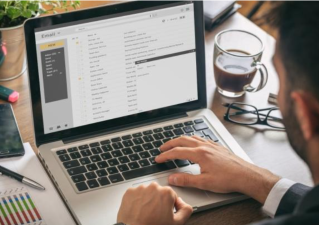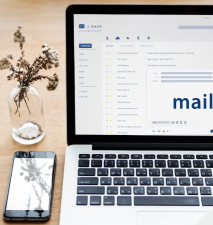Why do you want to use email more at work? Because email is now mainly used for office communication in enterprises and institutions, the answer to this question still lies in corporate email. Email, its security, stability, scalability, and behavior controllability are all factors that cannot be replaced.Whether offices should completely abandon email requires a comprehensive assessment of its functionality, efficiency, and applicable scenarios. Email has unique advantages in terms of formality, archiving, and cross-platform communication, while instant messaging tools are more efficient in real-time collaboration, but a complete replacement may be unrealistic or the optimal solution.

Features of email
Formality and documentation:
Email is a formal written communication method, usually used to transmit important information, formal documents and long texts. In the workplace, formality and documentation are very important, especially when it is necessary to record decisions, communicate clear instructions or transmit project files.
Not restricted by time zone and geographical location:
Email is an asynchronous communication method, which means you don’t need to be online at the same time, don’t need to worry about time zone differences, and don’t need to worry about whether the other party is working. This is very useful for international cooperation or cross-time zone projects.
Leave traces and search:
Emails are usually saved in the mailbox, and you can view previous email records at any time, which is very useful when you need to find a specific information or evidence. Email clients usually also provide search functions, allowing you to quickly find the information you need.
Attachments and file transfer:
Email is a convenient way to deliver files. You can easily attach files, documents, pictures, etc., and most email service providers offer relatively large attachment size limits.
Tracking and reminders:
Emails usually have read and unread status, so you can know whether the other party has read your email. Moreover, you can set reminders to ensure that you don’t miss important information.
Applicable scenarios of email
Now that we know the advantages of email, what kind of scenarios are more suitable for using email at work? Let me share some applicable scenarios of email below.
Formal notifications and file delivery:
When you need to send formal notifications, contracts, reports or other documents to team members, partners or customers, email is the first choice. It ensures the integrity and formality of the document, and it is also easy to record.
Cross-departmental and cross-time zone collaboration:
In large organizations, collaboration between different departments and different locations is very common. Email makes cross-departmental and cross-time zone collaboration smoother, without the need to be online at the same time, and without worrying about time differences.
Important decisions and instructions:
When it comes to important decisions, project instructions or strategic plans, email can ensure that information is accurately communicated and recorded. This is very important to avoid misunderstandings and disputes.
Long-term records and archiving:
As a written form of communication, emails can be stored and archived for a long time. This is very important for legal compliance, auditing, project tracking, and historical records.
Task assignment and tracking:
Emails can be used to assign tasks, set deadlines, and track the progress of tasks through email reminders. This helps improve team collaboration efficiency.
How to write an effective work email?
Now that we know the importance and applicable scenarios of emails at work, how to write an effective work email? Below I share some suggestions to help you write clear and efficient emails.
- Clear subject: The subject of the email should briefly summarize the content of the email. A good subject allows the recipient to know the subject of the email at a glance and decide whether to read it immediately or postpone it.
- Clear recipients: Make sure you choose the right recipients and don't abuse them in the CC list. Only necessary people need to receive emails, which helps reduce noise and confusion.
- Clear body: In the body of the email, use clear and concise language to express your meaning. Avoid long paragraphs and complex sentences. Use paragraphs, punctuation, and lists to improve readability.
- Clear requests and action items: If you expect the recipient to take a certain action, make sure the request is clear and specify a deadline. This helps avoid misunderstandings and delays.
- Attachments and links: If you need to attach files or links, make sure they are easy to find. Give files and links clear names and descriptions.
- Politeness and respect: Use polite and respectful language in your emails and avoid using offensive language. Use appropriate greetings and signatures at the beginning and end of your emails.
- Email signature: Provide your contact information in your email signature, including your name, title, company, and contact information. This helps ensure that your identity and contact information are clearly visible.
- Email format: Choose a clear email format, including an appropriate font, size, and color. Avoid using too much fancy formatting to ensure that the email is easy to read.
- Review and proofread: Always review and proofread the content of your email before sending it. Check for spelling, grammar, and expression.
- Reply promptly: If you receive a work email, try to reply promptly, even if it is a short confirmation email. This helps maintain good work communication habits.

Tips for email management
In addition to writing a good email, email management is also a key skill at work. Here are some tips for email management to help you maintain a clear inbox and efficient workflow.
- Use folders or labels: Sort emails into folders or labels based on project, subject, or importance. This can help you find and organize emails more easily.
- Set filters and rules: Use the filter and rule features of your email client to automatically categorize or tag specific types of emails. This can save time and reduce manual management work.
- Clean up your inbox regularly: Clean up your inbox regularly, delete unnecessary emails, and move processed emails to archive folders. Keep your inbox simple.
- Set reminders and deadlines: When dealing with important emails, set reminders and deadlines to ensure that important tasks and deadlines are not missed.
- Avoid reply all: When replying to emails, avoid unnecessary "reply all" and only reply to those who really need to know.
- Use tags or stars: Use tags or stars to mark important emails so that you can view or deal with them later.
- Backup and export: Back up important emails regularly to prevent data loss. You can export emails to local storage or cloud storage.
- Learn shortcuts: Being proficient in using the shortcuts of your email client can greatly improve your efficiency in handling emails.
Challenges and solutions for email communication
Although emails have many advantages in work, they also have some challenges. Below I share some common challenges and solutions.
- Spam and junk mail: Spam may flood your inbox and cause you to miss important emails. The solution is to check the spam folder regularly and move the misjudged emails back to your inbox.
- Information overload: Sometimes your inbox may be filled with all kinds of emails and it is difficult to handle. The solution is to use filters, labels, and folders to organize emails and prioritize important emails.
- Email abuse: Some people may abuse emails and send a large number of irrelevant emails, causing interference. The solution is to clearly tell the sender your email preferences and set filters to automatically classify unnecessary emails.
- Follow up emails: Sometimes you may need to track certain emails to ensure that you receive a reply or take action. The solution is to use reminders or mark emails as to-do items for follow-up.
The future of email
As technology continues to develop, email remains an important way of communication at work, but it is also evolving. Emails in the future may be more intelligent, providing more collaborative features and security. Emails may be integrated with other communication tools, project management tools, and calendars to provide a more comprehensive working environment.
In short, email plays an irreplaceable role in work. It has the advantages of formality, documentation, cross-time zone collaboration, traceability, and search, and is suitable for many work scenarios. Through effective email management and communication skills, we can make better use of emails and improve work efficiency.
